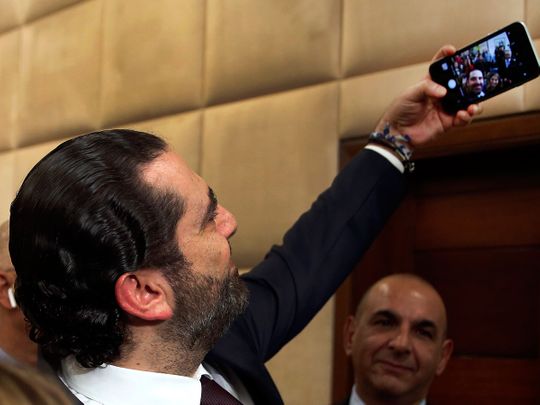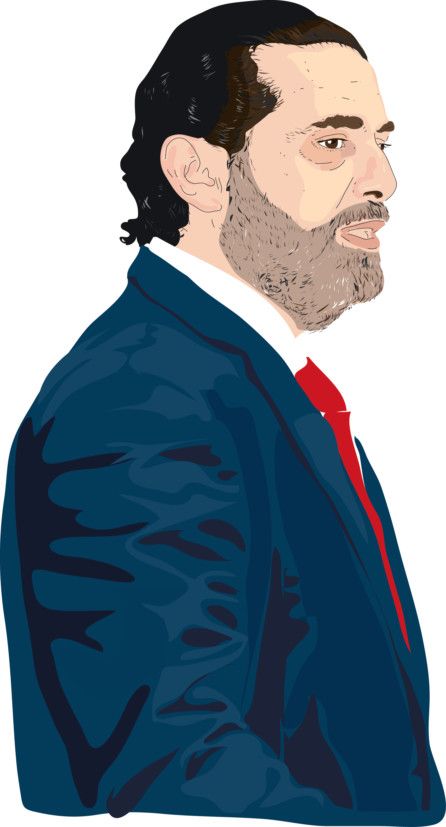
Sa’ad Hariri made headlines this week, after resigning from the Lebanese premiership. The resignation came after spontaneous demonstrators took to the streets of Beirut and other Lebanese cities, demanding economic reforms and rehaul of the entire political system.
For two solid weeks, demonstrators from all sects and political backgrounds have been calling for the resignation of his government, mainly objecting to the arrogance and reported corruption of Foreign Minister Gibran Bassil, head of the Free Patriotic Movement (FPM) and son-in-law of President Michel Aoun. Hariri said that he sympathised with the people’s legitimate concerns, repeating a slogan often spoken by his father, the late Prime Minister Rafik Al Hariri: “Nobody is bigger than his country.”
In his second address to the nation on October 21, Hariri had promised a basket of economic reforms aimed at soothing public anger. They included reducing the salaries of current and former presidents, ministers, and prime minister by 50 per cent, cancelling unnecessary institutions like the Ministry of Information, and raising interest on banks from 17 per cent to 35 per cent, hoping to reduce deficit. Demonstrators refused to leave public squares, however, saying that those reforms were too little, too late.
They presented him with their own list of demands, which included creating a transitional body made up of independent judges to run the country during the interim period.
They also asked that his government lift secrecy laws on the bank account of prominent politicians, in order to freeze those exceeding $100 million (Dh367.8 million). They also demanded abolishing the National Pact of 1943, a gentlemen’s agreement that divides the country’s top posts along religious lines.
Hariri said that he would support early parliamentary elections, despite the fact the current chamber was voted into office just last year. For lack of credible alternatives, however, Hariri would face little challenge within his Sunni community, easily winning the popular vote in cities like Beirut and Sidon
Early parliamentary elections
Before leaving office, Hariri said that he would support early parliamentary elections, despite the fact the current chamber was voted into office just last year. For lack of credible alternatives, however, Hariri would face little challenge within his Sunni community, easily winning the popular vote in cities like Beirut and Sidon.
His parliamentary bloc had entitled him to six out of thirty portfolios in government, including the premiership. Other posts under his command were telecommunications, information, technology, youth empowerment, and the strategic Ministry of Interior, led by Raya Al Hassan.
The outgoing government was formed last year, after much delay caused by Hezbollah’s attempts at naming one Sunni minister from outside of Hariri’s team — which he flatly rejected. He did invite Hezbollah to join his cabinet, with the portfolios of youth, health, and parliamentary affairs.
No cabinet can pass in Lebanon if it is not okayed by all prominent parliamentary blocs, securing Hariri’s blessing for any future government formation.
Sa’ad Hariri rose to prominence after the assassination of his father back in February 2005. He blamed the murder on Hezbollah, Syria, and Iran, an accusation that has often been repeated by Hariri’s allies. Born in Riyadh in 1970, Hariri holds dual Lebanese and Saudi citizenship. His mother is Iraqi while his wife hails from a prominent Syrian family. He studied business administration at Georgetown University, graduating in 1992.
For thirteen years, he helped manage his father’s business empire, before returning to Lebanon to inherit the Future Movement, then in-charge of the March 14 Alliance that was leading the “Cedar Revolution” which ejected Syrian troops from Lebanon.
He propped up on his father’s confidants, Fouad Siniora, as prime minister from 2005 to 2009, and took over the job himself on November 9, 2009. At the time, he was only 39-years old. He was the only senior politician in Lebanon who was not a product of the country’s civil war and who never commanded an armed group in his career.

Heightened tension
Hezbollah joined Hariri’s cabinet, after he promised to protect the “arms of the resistance” but eventually walked out on him on June 13, 2011, in the midst of a meeting that he was having with President Barack Obama at the White House. His national unity cabinet collapsed automatically, becoming un-constitutional since it no longer represented all the country’s political and sectarian components.
The walkout was in response to heightened tension over the Special Tribunal for Lebanon (STL), the UN-led investigation of his father’s murder, which was starting to point fingers at top Hezbollah officials.
Hariri spent the next years in Saudi Arabia, citing security concerns at home, returning to Beirut in August 2014. In November 2016, Saudi Arabia and Iran reached a deal on Lebanon, allowing for Hariri’s return to the premiership, in exchange for accepting Michel Aoun, a Hezbollah ally, as president.
The 2017 resignation
One year later, Hariri delivered a televised address from Riyadh on November 4, 2017, resigning from office while citing Iran and Hezbollah’s tutelage in the Middle East. Hariri eventually backtracked his resignation, returning to Lebanon later that month. The ex-Prime Minister has been reportedly cash-strapped in recent years, and months ago, was forced to close his party’s mouthpiece, Future Television, one year after shutting down its daily newspaper, Al Mustaqbal.
Sami Moubayed is a Syrian historian and former Carnegie scholar. He is also the author of Under the Black Flag: At the frontier of the New Jihad.










